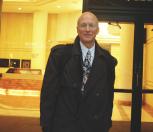By criminalizing consensual polyamorists along with patriarchal polygamists, the BC and federal governments will break up loving families, a Canadian Polyamory Advocacy Association (CPAA) lawyer said on Nov 25.
“The attorneys general have lost their moral compass,” John Ince told a BC Supreme Court reference on the constitutionality of Section 293 of the Criminal Code.
A British Columbia court began hearings Nov 22 to determine whether Canada’s law prohibiting polygamy violates basic human rights.
The polyamorists maintain Section 293 infringes on their constitutional rights of association, religion, equality and the life, liberty and security of the person as outlined in the Charter of Rights and Freedoms.
A subsection of the law prohibits any kind of conjugal union with more than one person at the same time, whether or not it is by law recognized as a binding form of marriage, or celebrates, assists or is a party to a rite, ceremony, contract or consent that purports to sanction a relationship.
Ince was one of several lawyers addressing BC Supreme Court Chief Justice Robert Bauman this week.
The case stems from BC’s failed attempts to prosecute leaders of the Fundamentalist Church of Jesus Christ of Latter Day Saints (FLDS) community in Bountiful, known for its polygamous marriages.
FLDS lawyer Bob Wickett told Bauman the law forces his clients to live as pariahs unable to access legal or health services for fear of being jailed due to their marital status.
He said church members know they are neither understood nor accepted by most Canadians.
“We are embarking on an historical reference,” Bauman acknowledged.
George Macintosh is the amicus curiae, or friend of the court, with the job of arguing on behalf of those who oppose Section 293 of the Criminal Code.
As the law sits now, he told Bauman on Nov 24, “it encompasses polygamy, it encompasses polyandry and it encompasses polyamory.”
“The law ignores casual group sex, but it criminalizes relationships,” Macintosh said.
“This law is not aimed at protecting anyone,” he added. “It criminalizes all involved in such relationships.
“Freedom of association is infringed when it is illegal for three or more people to perform what is legal for two people to perform,” Macintosh said.
Ince called the polyamorous community a secondary target of the law. The focus of the law is on patriarchal polygyny, he says, where a man has two or more wives simultaneously.
He said that form of relationship puts women in an inferior position, not the case in polyamorous relationships.
Polyamorous relationships of whatever configuration are based on egalitarianism, he maintained.
He said the governments’ approach would criminalize loving relationships entered into freely. “This is deeply disturbing to the polyamorous community.”
There has been no evidence to show polyamorous relationships cause harm, he continued.
“They are proposing to criminalize a whole group of people without having done any research,” Ince said.
Lawyer Doug Christie of the Canadian Association for Free Expression warned the court of the danger of letting government define relationships.
“The big danger is that if government defines family relationships, there will be value judgments,” he said.
Christie rejected the government’s assertions that polygamy can cause problems such as patriarchies and sexual abuse as have been alleged at Bountiful. He said such issues exist far beyond the southeastern BC commune and pointed to the Roman Catholic Church as an example.
The hearing has drawn wide interest and is expected to continue until the end of January.
A host of Christian, children’s advocacy, freedom of expression and women’s groups are expected to make submissions.
The BC Civil Liberties Association is also planning to make a submission. It thinks people should be free to make the life choices they wish as long as those choices do not harm other people and they engage in them with free, informed and full consent.
“Our position is that it is inappropriate to use the criminal law against unpopular religious or other groups where the activity involved is a matter of personal choice and is consensual,” said president Robert Holmes in a news release.
“Using the criminal law in that manner is abusive, discriminatory and inappropriate.”
The provincial government has insisted the case is not solely about Bountiful. Lawyer Craig Jones said he intends to show polygamy harms women and children, as well as society as a whole.
“Direct evidence from Bountiful… presents a consistently worrisome narrative of child brides, teen pregnancy and men and boys who are, by accident or design, driven out of the community,” Jones’s written opening submission says.
In providing background to the reference, Jones told Bauman the law was put into the Criminal Code in 1892 amid concerns about the activities of First Nations’ leaders and Mormon immigrants to southern Alberta.
Jones said the law wasn’t used to prosecute Mormons until the Bountiful leaders were charged in January 2009.
The charges were later dropped when the court ruled the BC attorney general had gone “special prosecutor shopping” to find a lawyer willing to pursue the case after the first two prosecutors recommended against.
Jones expects evidence to come from a number of experts as well as from people who have lived in polygamous communities in Canada, Arizona and Texas. Some witnesses will be allowed to testify behind screens to protect their identities, the judge ruled.
Polygamy charges currently carry a maximum penalty of five years in prison.

 Why you can trust Xtra
Why you can trust Xtra


